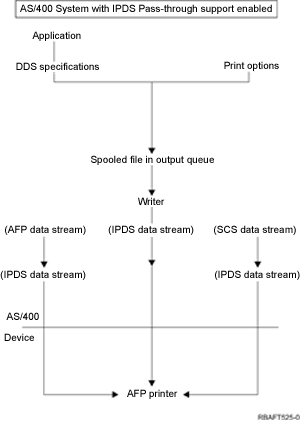
Before printing, SNA character string (SCS) files are converted to Intelligent Printer Data Stream™ (IPDS™) files. These are then converted to Advanced Function Presentation™ data stream (AFPDS), and then to printer-specific IPDS. Also, IPDS files are converted to AFPDS, then are converted to printer-specific IPDS. The final IPDS files have specific commands for your printer. You can choose to skip the conversion to AFPDS and to printer-specific IPDS. This is called IPDS pass-through. IPDS pass-through is specified on a PSF configuration object.
Specifying IPDS pass-through in the PSF configuration object allows only those spooled files eligible for IPDS pass-through to bypass the extra transforms. Those spooled files not eligible for IPDS pass-through are still transformed to AFPDS and then to printer-specific IPDS.
This figure shows the data stream origination, flow, and conversion for a spooled file when IPDS pass-through support is enabled.

Consider using IPDS pass-through if one of these apply:
Limitations of IPDS pass-through
These IPDS pass-through limitations determine whether a spooled file or printer is eligible for IPDS pass-through:
Spooled files that contain the following data or printer file attributes are not eligible for IPDS pass-through:
If IPDS pass-through is specified but the spooled file is ineligible, a diagnostic message is sent and the spooled file is processed as usual. It is transformed to AFPDS and then to printer-specific IPDS.
When a printer writer is started to an AFP(*YES) printer that does not support IPDS pass-through and IPDSPASTHR(*YES) is specified, a diagnostic message is sent. The spooled file is transformed to AFPDS and then to printer-specific IPDS.